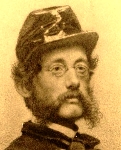 Open main menu
Open main menu
 Open main menu
Open main menu

E.B. Dalton
(1834 - 1872)
Home State: Massachusetts
Education: Harvard College, College of Physicians and Surgeons, Class of 1858
Command Billet: Regimental Surgeon
Branch of Service: Medical
Unit: 36th New York Infantry
Before Antietam
Son of a doctor, he graduated from Harvard (1855) and the College of Physicians and Surgeons, NY (1858). He had served an internship at Bellvue, and was a resident at St Luke's Hospital in New York City at the start of the War. He was appointed a Surgeon by the State of NY and served on the chartered steamship Quaker City, and was then appointed Surgeon of the 36th New York Infantry on 31 October 1861. He became sick (malaria?) on the Peninsular Campaign, and was on leave to recover in July and August 1862. He rejoined his Regiment as they were departing Washington on about 3 September.
On the Campaign
He was with his regiment until they reached Poolsville, MD on 10 September 1862, when he returned to Washington to (successfully) defend himself, after being dismissed from the service for being absent without leave. He was back with the regiment on or about 17 September.
The rest of the War
He was with the 61st at Fredericksburg, VA. On 2 January 1863 he was appointed Sixth Army Corps Medical Inspector, and on 26 March, Surgeon, US Volunteers (vice Regimental Surgeon). During the Summer of 1863 he was transferred to the Department of Virginia (General Dix) at Fortress Monroe as Medical Director. In September he was appointed Chief of the Balfour Hospital at Portsmouth, VA, and in March 1864 he requested and was granted transfer back to the Army of the Potomac as Medical Inspector. He was in charge of medical care for the thousands of casualties of the Wilderness Campaign and later actions of that year, organizing and managing a network of hospitals in and around Fredericksburg, VA., and later moving it all North when the Army retreated from that area. He was then in charge of the depot hospital at City Point, VA to March 1865, when he was assigned as Medical Director of the Ninth Army Corps. He resigned his commission on 12 May 1865 as the War had substantially ended.
After the War
He was honored by brevets to Lieutenant Colonel and Colonel for his War service in August 1865. He opened a practice in New York City in September 1865, and was chair of the Metropolitan Board of Health until 1869. He also taught at the College of Physicians and Surgeons, and worked with medical charities. By 1869 he was ill enough with pleurisy to leave his practice. He lived briefly in the south of France and travelled in Switerland, and felt improved enough to return home in October 1870. He was then in practice in Boston at Massachusetts General and taught at Massachusetts Medical College, but his illness returned. He went to Southern California in October 1871 for the milder climate, but his dieease advanced and he died there in mid-1872.
References & notes
Life details and the photograph here from his brother John C. Dalton's Memorial of Edward B. Dalton, M. D. (1872). Service details from Heitman1.
More on the Web
There's a portrait painting of him in uniform in Harvard's Memorial Hall.
Birth
09/21/1834; Lowell, MA
Death
05/13/1872; Santa Barbara, CA; burial in Santa Barbara Cemetery, Santa Barbara, CA
1 Heitman, Francis Bernard, Historical Register and Dictionary of the United States Army 1789-1903, 2 volumes, Washington DC: US Government Printing Office, 1903, Vol. 1, pg. 351 [AotW citation 11982]